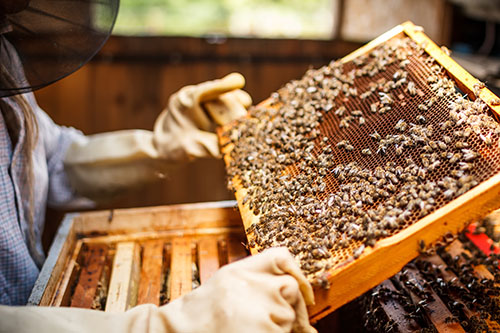Beekeeping Basics
Sep 06, 2023

Bees play a vital role in our ecosystem and the agriculture industry. They’re responsible for pollinating $15 billion worth of crops in the United States each year, and globally, they pollinate over one-third of the world’s food crops, contributing to the growth of over 130 varieties of fruits, vegetables, and nuts that end up on our tables.
Becoming a beekeeper and taking advantage of this free, agricultural service is both a rewarding and educational experience, but sometimes it can be challenging to know where to get started. Here are a few tips to consider:
Educate yourself
Before diving in, read books, attend workshops, and join local beekeeping clubs to gain a better understanding of the life cycle of bees, their needs, and the unique challenges they face. Your local Co-op may host informational sessions on topics such as beekeeping basics, so make sure to reach out to them before you get started.
Check regulations
Before you set up your hive, check the regulations and requirements for beekeeping in your area. Some regions may have zoning restrictions or specific guidelines for beekeeping, so make sure your apiary is compliant. Set up your apiary away from high-traffic areas to prevent disruptions and bee-human conflicts. In Tennessee, new apiaries are required to be registered with the Tennessee Department of Agriculture.
Get the necessary equipment
Quality equipment ensures both your safety and the comfort of your bee colonies. Before introducing your bees to your apiary, you will need essential items such as beehives, frames, foundation wax, hive tools, a smoker, a bee suit, gloves, and a veil. Your local Co-op likely has a selection of beekeeping supplies in stock or available for order such as starter kits, smokers, and protective clothing, so stop by or give them a call for more information.
Manage pests and diseases
Maintaining a healthy hive involves learning to identify common issues such as pest infestations and diseases and implementing strategies to mitigate their impact. Beetles and mites can quickly overrun a hive; in fact, Varroa mites can be found in nearly every hive in the United States. However, there are numerous natural methods that can be used to control pest populations, such as planting thyme around your hives or dusting the bees with powdered sugar.
Never stop learning
Beekeeping is a continuous learning experience, so embrace the learning curve and be open to adapting your approach as you gain more experience. Talking to other beekeepers in your area is often the best way to gain new insight and tips, so create a network that is willing to share advice and observations from their experience. Although there is a lot to learn, the benefits are well worth it!
Don’t hesitate to reach out to your local Co-op before you get started for expert advice and quality beekeeping supplies. Find the nearest location here.
For more content like this, check out the latest issue of The Cooperator.
Becoming a beekeeper and taking advantage of this free, agricultural service is both a rewarding and educational experience, but sometimes it can be challenging to know where to get started. Here are a few tips to consider:
Educate yourself
Before diving in, read books, attend workshops, and join local beekeeping clubs to gain a better understanding of the life cycle of bees, their needs, and the unique challenges they face. Your local Co-op may host informational sessions on topics such as beekeeping basics, so make sure to reach out to them before you get started.
Check regulations
Before you set up your hive, check the regulations and requirements for beekeeping in your area. Some regions may have zoning restrictions or specific guidelines for beekeeping, so make sure your apiary is compliant. Set up your apiary away from high-traffic areas to prevent disruptions and bee-human conflicts. In Tennessee, new apiaries are required to be registered with the Tennessee Department of Agriculture.
Get the necessary equipment
Quality equipment ensures both your safety and the comfort of your bee colonies. Before introducing your bees to your apiary, you will need essential items such as beehives, frames, foundation wax, hive tools, a smoker, a bee suit, gloves, and a veil. Your local Co-op likely has a selection of beekeeping supplies in stock or available for order such as starter kits, smokers, and protective clothing, so stop by or give them a call for more information.
Manage pests and diseases
Maintaining a healthy hive involves learning to identify common issues such as pest infestations and diseases and implementing strategies to mitigate their impact. Beetles and mites can quickly overrun a hive; in fact, Varroa mites can be found in nearly every hive in the United States. However, there are numerous natural methods that can be used to control pest populations, such as planting thyme around your hives or dusting the bees with powdered sugar.
Never stop learning
Beekeeping is a continuous learning experience, so embrace the learning curve and be open to adapting your approach as you gain more experience. Talking to other beekeepers in your area is often the best way to gain new insight and tips, so create a network that is willing to share advice and observations from their experience. Although there is a lot to learn, the benefits are well worth it!
Don’t hesitate to reach out to your local Co-op before you get started for expert advice and quality beekeeping supplies. Find the nearest location here.
For more content like this, check out the latest issue of The Cooperator.